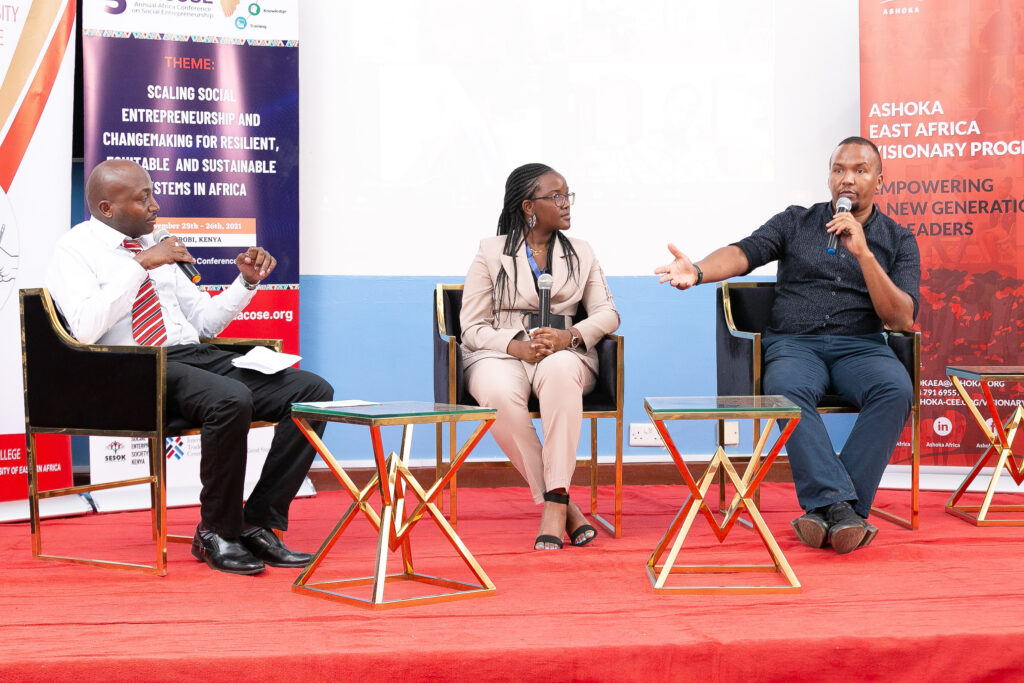SOCIAL ENTERPRISE CONFERENCE: Speakers call for the building of sustainable systems for a thriving Africa

As the fifth edition of the Annual African Conference on Social Entrepreneurship (AACOSE) concludes today, stakeholders have called for collaborative efforts towards social entrepreneurship and change-making for resilient, equitable and sustainable systems that will create a lasting impact on Africa’s communities.
The convening witnessed thought leadership contributions towards enhancing ambitions to build ecosystems beyond traditional silos, develop strong linkages and win-win partnerships with the rest of the world, contextualize global challenges and find ways to scale solutions to Africa’s pressing challenges.
Vincent Odhiambo, Regional Director at Ashoka East Africa, said:
“The AACOSE conference has come at a time when stakeholders in the public and private sectors need to come together to discuss policy, financial and other strategic support for social entrepreneurs, and we are glad to see representation from key players. The resilience of social enterprises in a time of crisis creates an opportunity to refine our existing socio-economic model with a more inclusive way of doing business. Social entrepreneurs proved to be particularly agile and innovative when dealing with the huge changes created by the pandemic: a majority of them modified their business models and increased their operations online. Such adjustments will ensure that despite shocks experienced in our systems, solutions to social problems remain sustainable.”

Considering the effects of the COVID-19 pandemic on food and nutritional security, climate change, unemployment, among other challenges leaving communities less resilient and more vulnerable, governments and international development organizations were entreated to prioritize understanding the impact and the potential of social enterprise on alleviating social and environmental challenges facing Sub-Saharan Africa.
While social entrepreneurs have been an inspiration during the crisis thanks to their leadership and creativity, most of them have also been significantly affected by the lockdown and the crisis. Based on an internal Ashoka study, 53% of social entrepreneurs anticipate a funding shortfall of over 40% this year. 33% are very concerned that funding is becoming more short term and 26% that funding is moving away from their field. Only a small share of the relief initiatives has gone towards the sector.
Climate change discussions took center stage as stakeholders examined the devastating effects on the lives and societies with a heavy bearing on agriculture. According to the Centre for International Forestry Research CIFOR and World Agroforestry (ICRAF), increasing temperatures and sea levels, changing precipitation patterns, and more extreme weather have posed a threat to Africa’s development.
Participants urged entrepreneurs to adjust or change their supply chain for businesses to become more environmentally sustainable in order to have a more positive bearing on the climate. Other thematic areas such as continental integrity for prosperity, technological innovations, employability for social change, social business and sustainable investment and social entrepreneurship and change-making were also explored.
Jonas Yawovi Dzinekou, Director of the Institute for Social Transformation (IST) at Tangaza University College, said:
“Social entrepreneurs are the leaders for positive transformation in Sub-Saharan Africa where millions of people remain excluded from basic amenities such as food and education. They have not only created a significant number of jobs across the region but have done so for underserved communities. They are more than just businesses; they serve a social purpose, sustaining livelihoods that build strong communities and support groups hitherto side-lined by traditional business models.”
Social entrepreneurship has played a role to provide inclusive technological-based solutions to socio-economic challenges across Africa. In Kenya, Togo, Tanzania, and Senegal, to mention but a few, empowered Ashoka fellows, through innovative strategies, have improved the livelihoods of many and created life-changing solutions for communities.
In Kenya, for example, David Kuria, an Ashoka Fellow, through innovative finance schemes, engages urban communities in the design and construction of his “Iko toilet” to make sanitation facilities a profitable venture for the urban poor and the business community. Due to the success of this venture, David is keen to spread the facilities to the other 198 slums in Kenya.
In Tanzania, an Ashoka Fellow, Isaya Yunge, designed Somaapp, a mobile phone and web application that makes it easier for Tanzanian students to find opportunities for scholarship funding. The app has an algorithm that automates the search and provides results tailored to a particular student, enabling high chances to secure scholarships. In Senegal, Karima Grant initiated the Marche Math Project to strengthen the math skills of primary school students. To reach remote schools, Karima works with nomadic caravans, who have access to these schools.
The conference also noted that supporting young people in realizing their potential as changemakers is one of the most important offerings we can make to young people and society alike as we think of a more resilient, just, equitable and sustainable future where everyone has the requisite mindset, resources and network to match challenges with solutions.
Under the theme ‘Scaling Social Entrepreneurship and Changemaking for Resilient, Equitable and Sustainable Systems In Africa ’, the AACOSE 5 was attended by over 500 people from across the continent and the world, providing a platform to showcase replicable models that have proved successful in Africa.





